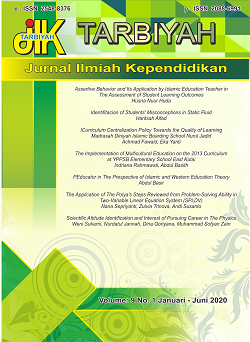Assertive Behavior and Its Application by Islamic Education Teacher in The Assessment of Student Learning Outcomes
DOI:
https://doi.org/10.18592/tarbiyah.v9i1.3356Abstract
This study aimed to find out the application of assertive behavior by the teacher of Islamic Education Studies and to determine the results of the application in improving students’ achievement in SMPN 1 Godean. This research is a descriptive qualitative field research. The data collection methods were observation, documentation and interview. Furthermore, the data analysis were using the model of Miles and Huberman which are data reduction, data presentation, and drawing conclusions. The results of this study indicated that the behavior of Islamic Education Studies teacher is able to express the feelings well, sometimes expressed thoughts and beliefs openly and able to maintain the personal rights. Based on those 3 components and 4 characteristics of assertive behavior, the teacher applied 2 components and 3 characteristics of assertive behavior. Thus, the results of the application of Islamic Education Studies teacher's assertive behavior made students in learning the subject were more contented and enthusiastic so that this has an effect on students’ achievement, as evidenced by the students’ high scores on final test which have an average value above the Minimum Standard Criteria (KKM).References
Alberti, Robert & Michael Emmons, Your Perfect Right (Hidup lebih bahagia dengan mengungkapkan hak), Jakarta: PT Elex Media Komputindo, 2002.
Ardianto Tola, “Pengaruh Komunikasi Positif dalam Keluarga dan Komunikasi Interpersonal Guru terhadap Perilaku Asertif Siswa”, Skripsi , Institut Agama Islam Negeri Manado, 2016.
Fathurrohman, dkk., Guru Profesional, Bandung: PT Refika Aditama, 2012.
Fensterheim, Harbert & Jean Bear, Jangan Bilang Ya Bila Anda Akan Mengatakan Tidak, Jakarta: Gunung Jati, 1995.
Goleman, Daniel, Kecerdasan Emosional, Jakarta: Gramedia Pustaka Utama, 2007.
H. B. Sutopo, Pengantar Penelitian Kualitatif: Dasar-dasar Teori Praktis, Jakarta: Rineka UNS Pers, 1998.
Hamzah B. Uno, Orientasi Baru Dalam Psikologi Pembelajaran, Jakarta: PT. Bumi Aksara, 2006
Helmawati, Pendidik sebagai Model, Bandung: PT Remaja Rosdakarya, 2016.
Mathew B. & A. Michael Hiberman, Analisis Data Kualitatif, Penerjemah: Tjetjep Rohidi Rohindi, Jakarta: UI press, 1992.
Moleong, Lexi J., Metode Penelitian Kualitatif, Bandung: PT Remaja Rosdakarya, 2007. Milles,
Sugiyono, Metode Penelitian Pendidikan Pendekatan Kuantitatif, Kualitatif, dan R&D, Bandung: Alfabeta, 2015.
Suharismi Arikunto, Prosedur Penelitian Suatu Pendekatan Praktis, Jakarta: Rineka Cipta, 2012.
Syahrul Abidin, “Strategi Komunikasi Guru dalam Meningktkan Prestasi Belajar”, dalam Jurnal Ihayul Arabiyah Fakultas Ilmu Sosial UIN Sumatera Utara Medan, vol. 3 No. 2 (Desember, 2017), hal. 116.
Downloads
Published
How to Cite
Issue
Section
License
Authors retain copyright and grant the journal right of first publication with the work simultaneously licensed under a Creative Commons Attribution 4.0 International License that allows others to share the work with an acknowledgment of the work's authorship and initial publication in this journal.




